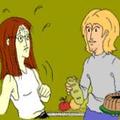Ĉapitro 18.1
Chapter 18.1
Capítulo 18.1
Глава 18.1
"Via situacio ne plaĉas al vi, ĉu?
"You don't like your situation, do you?"
Vi dezirus ŝanĝi ĝin, ĉu ne?
You would like to change it, wouldn't you?
Nu, estas facile ŝanĝi vian situacion.
Well, it's easy to change your situation.
"Vi ŝatus manĝi ion, ĉu ne?
"You'd like to eat something, wouldn't you?
Pecon da pano vi deziras, tute certe.
A piece of bread you want, for sure.
Aŭ ĉu frukton?
Or a fruit?
Jen, rigardu, mi havas pomon kaj oranĝon por vi.
Here, look, I have an apple and an orange for you.
Kiel belaj ili estas!
How beautiful they are!
Plenaj je suko, evidente.
Full of juice, obviously.
Se vi estus konsentinta labori por ni, vi jam estus plene sata.
If you had agreed to work for us, you would have been fully satisfied.
Kaj jen io alia: kuko.
And here's something else: cake.
Ĉu ne bonega, belega, manĝinda kuko?
||||mangeable gâteau|
Isn’t that a great, lovely, edible cake?
Ankoraŭ varma, ĵus bakita.
Still hot, freshly baked.
Tuŝu, sentu mem, kiel plaĉe varmeta ĝi estas.
|||||tiède||
Touch, feel for yourself how pleasantly warm it is.
Vi malsatas nur pro via stulteco.
|a faim||||
You are starving just because of your stupidity.
Se vi estus saĝa, vi konsentus fari la etan laboron, kiun mi petas de vi, kaj vi tuj ricevus la manĝaĵojn.
||||||||petit travail||||||||||||
If you were wise, you would agree to do the little work I ask of you, and you would get the food right away.
Mi bedaŭras, ke vi estas tiel obstina.
I'm sorry you're so stubborn.
Estas bedaŭrinde, vidi tiel belan knabinon suferi pro malsato.
||||||||faim
It is unfortunate to see such a beautiful girl suffering from hunger.
Mi sincere bedaŭras vian obstinecon.
I sincerely regret your stubbornness.
Nur eta "jes", kaj ĉio ĉi estos via. "
Just a little "yes", and all this will be yours. "
Li ŝajnigas sin afabla, sed estas io tre aĉa en lia vizaĝa esprimo.
|semble|||||||||||
He pretends to be kind, but there is something very nasty in his facial expression.
Gerda sentas sin pli kaj pli malforta.
Gerda feels weaker and weaker.
Estas varme en ĉi tiu ĉambraĉo, kio ne estas facile elportebla.
|||||chambre|||||portable
It's hot in this room, which is not easy to bear.
Krome, ŝi malsatas, kaj la vido de tiu pomo kaj de tiu oranĝo estas vere suferiga.
|||||||||||||||affligeante
Besides, she's hungry, and the sight of that apple and that orange is really painful.
Kaj tamen ŝia devo estas diri "ne".
And yet her duty is to say "no".
"Ĉu vi legis la dokumenton, ĉu vi komprenis ĝin?"
"Did you read the document, did you understand it?"
li aldonas, kvazaŭ espere.
||comme si|
he adds, as if hopefully.
Kompreneble ŝi legis: ŝi estis scivola.
|||||curieuse
Of course she read: she was curious.
Almenaŭ ŝi bezonis scii, kial oni ŝin kaptis kaj senigis je libereco.
|||||||||deprived||
At least she needed to know why she had been captured and deprived of her liberty.
Tial ŝi legis.
That's why she read.
Estis malfacile kompreni, komence, sed iom post iom ŝia memoro plene revenis, ŝi rememoris la principojn de tiu sekreta lingvo, kaj ŝi sukcesis kompreni ĉion; ŝi havis nenion alian por fari.
||||||||||||||||||||||||tout||||||
It was difficult to understand, at first, but little by little her memory fully returned, she remembered the principles of that secret language, and she managed to understand everything; she had nothing else to do.
Dum multaj horoj ŝi estis sola kun tiu dokumento, kiun ili lasis al ŝi.
For many hours she was alone with that document they had left her.
Sed ŝi decidis neniam respondi al ili; ŝi ja antaŭ longe promesis al Profesoro Kosadi, ke pri tio ŝi ĉiam silentos.
|||||||||||a promis|||||||elle|toujours|se taire
But she decided never to answer them; she had long ago promised Professor Kosadi that she would always be silent about it.
Neniam ŝi ŝanĝos sian decidon.
||changera||décision
She will never change her mind.
"Ĉu vi legis la dokumenton?"
sonas duan fojon la aĉa voĉo.
||||horrible|
the nasty voice sounds a second time.
Ŝi plu silentas, kaj li eliras, furioza.
She is still silent, and he goes out, furious.
Li eliras kun la pano, la pomo, la oranĝo kaj la kuko.
Feliĉe, ke almenaŭ ili lasis al ŝi akvon, varmaĉan akvon, jes ja, apenaŭ trinkeblan, certe, preskaŭ ne sensoifigan, prave, sed tamen akvo.
||||laisser|||||||||||||sensoifiante||||
Luckily, at least they left her water, hot water, yes, hardly drinkable, sure, almost insensitive, right, but still water.
Malsaton eblas pli malpli elporti, sed soifon ne.
la faim||||porter|||
Hunger can be more or less tolerated, but not thirst.

